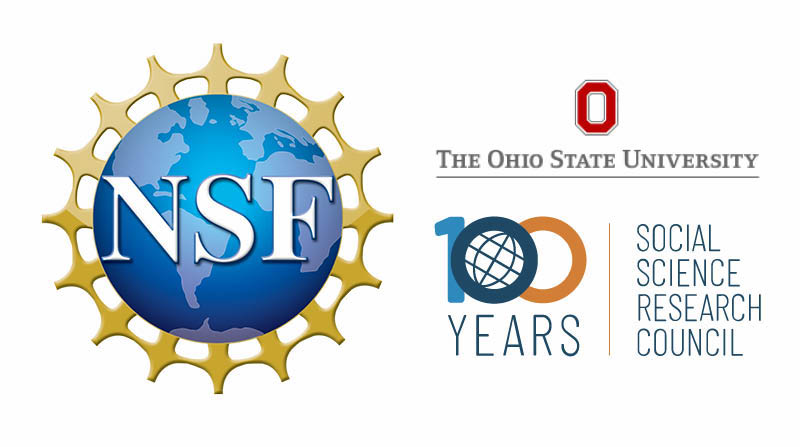Industries of Ideas: A prototype system for measuring the effects of TIP investments on firms and jobs
Industries of Ideas: A prototype system for measuring the effects of TIP investments on firms and jobs is an NSF-funded project to develop a new, data-driven way to measure the economic impact of federal investments in research and technology.
- The Problem: Stakeholders need to measure the effects of investments in emerging technologies on jobs and economies, but current data systems are not able to clearly identify emerging technologies and fields or to establish what industries they matter for.
- The Framework Solution: Focus on the people who are trained in research and the skills they carry into the workforce to identify employers involved in emerging industries and jobs at the forefront of these industries.
- The Data: This project builds on established and successful data systems at IRIS (university administrative data) and the Ohio Education Research Center at The Ohio State University (state longitudinal data systems) to create a prototype pipeline.
- The Prototype Pipeline: This project will develop people-centric methods for following the movement of ideas from investments in research into the marketplace. This is done by identifying businesses that employ people with deep skills in emerging technology areas and developing early, never-before-available indicators that can provide alerts associated with potential impacts on current and future workforce including, for example, the need for reskilling, upskilling, and new skill acquisition. Initially focused on the artificial intelligence and electric vehicle industries in Ohio, the goal is to create a data system that can be expanded and applied to other industries across the country. This will demonstrate the value of national investments in knowledge-driven regional economic development.
Data and tools developed by this project will allow universities participating in the IRIS consortium to:
- Document & amplify their research impact on jobs, businesses, and society
- Explain complex pathways of impact (students, vendors, discoveries, technology, expertise)
- Identify & attract partnerships and support from corporate and other non-federal sponsors
- Increase competitiveness for TIP and other CHIPS Act funding
- Develop collaborative relationships with local, state, and regional partners
“This project will demonstrate a new means for NSF, universities, and states to use timely data to understand, explain, and improve the effects research investments in critical technology areas have on people’s lives, the economy, and jobs. Rather than tracking documents or key words, our project relies on learning about how how skilled people with cutting-edge expertise move into innovative areas of the economy as a means to identify these effects.”
The project is based on close collaboration among three major stakeholder groups — university leaders, regional innovation ecosystem leaders, and state agency leaders — to help inform the design of the system, develop metrics for success, and make improvements to the system. The outreach and engagement with the stakeholder community, coordinated by the Social Science Research Council, will help secure the broadest possible use of the prototype and build support and momentum for planned future expansions.
Universities that join the IRIS consortium will be well positioned to help define, expand and benefit from the new data systems developed in this project. For more information on membership, see iris.isr.umich.edu/membership. IRIS issues interactive reports based on university data that illuminate the economic impact of research spending. For example, our Employee Report tracks the career paths of research-trained university employees. Visit iris.isr.umich.edu/membership/reports-and-products to see demonstrations of our reports.
Learn More
- Project Description
- Slide Presentation
- National Science Foundation Press Release
- Social Science Research Council project page
- University Advisory Board
- State Advisory Board
- American Enterprise institute report: The Industry of Ideas: Measuring How Artificial Intelligence Changes Labor Markets
By Julia Lane
“NSF’s strategic investments in key technologies warrant innovative tools to accurately assess the impact of these investments across the U.S. The Industries of Ideas project will develop a prototype to better understand the impact of NSF’s efforts through the new TIP directorate, providing rich, descriptive analyses of the interplay between our investments and people, jobs and regional economies.”
Partners

Advisory Boards
Advisory boards of representatives from universities and state workforce agencies will advise the project’s development, ensuring that the prototype will be scalable to additional states and technologies. The university advisory board, drawn from the members of SSRC’s College and University Fund for the Social Sciences and IRIS, will ensure that the data infrastructure enables universities to more accurately document the contributions of their research efforts to states’ economic development, and to secure additional research funding in emerging technologies. The state advisory board will ensure that the data infrastructure enables state governments to more effectively measure job quality in emerging technology industries, and to develop policies to support the growth of those industries. These boards will work together to ensure that the project empowers university and state agency partnerships that attract new investment in states’ innovation economies, and that measure the impacts of those investments.
Institute for Research on Innovation and Science
University of Michigan
Institute for Social Research
Survey Research Center
330 Packard St, 2354 Perry Bldg
Ann Arbor, MI, 48104-2910
P: (734) 615-0015
F: (734) 763-3862
IRIS-info@umich.edu
iris.isr.umich.edu
linkedin.com/company/iris-um/




